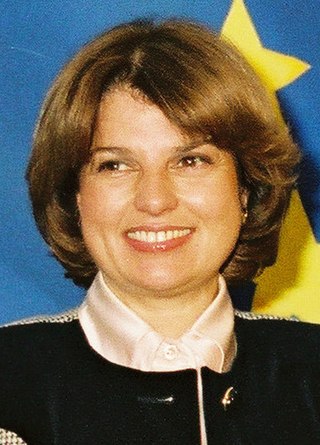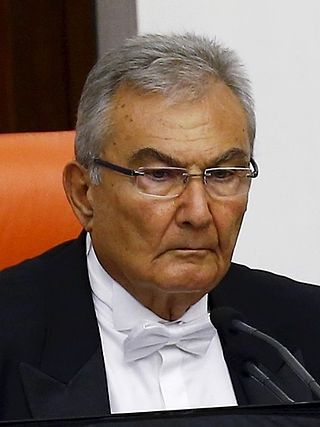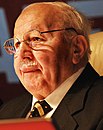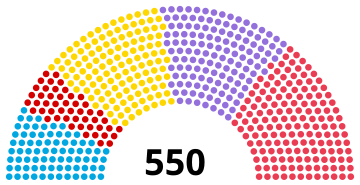
Ahmet Mesut Yılmaz was a Turkish politician. He was the leader of the Motherland Party from 1991 to 2002, and served three times as Prime Minister of Turkey. His first two prime-ministerial terms lasted just months, while the third ran from June 1997 to January 1999. The first was brought to an end by defeat in the 1991 elections, the latter two by the breakdown of Yılmaz' coalition governments.

Tansu Çiller is a Turkish academic, economist, and politician who served as the 22nd Prime Minister of Turkey from 1993 to 1996. She was Turkey's first and only female prime minister. As the leader of the True Path Party, she went on to concurrently serve as Deputy Prime Minister of Turkey and as Minister of Foreign Affairs between 1996 and 1997.

The Democrat Party, abbreviated to DP, is a liberal conservative Turkish political party, established by Ahmet Nusret Tuna in 1983 as the True Path Party. It succeeded the historical Democrat Party and the Justice Party, two parties with similar ideologies. Their sister party is the Good Party.

Erdal İnönü was a Turkish theoretical physicist and politician who served as the interim prime minister of Turkey between 16 May and 25 June 1993. He also served as the deputy prime minister of Turkey from 1991 to 1993 and as the minister of foreign affairs from March to October 1995. He served as the leader of the Social Democracy Party (SODEP) from 1983 to 1985 and later the Social Democratic Populist Party (SHP) from 1986 to 1993. He was the son of the second president of Turkey, İsmet İnönü.

The Motherland Party was a political party in Turkey. It was founded in 1983 by Turgut Özal. It merged with the Democrat Party in October 2009.

Deniz Baykal was a Turkish politician. A member of the Republican People's Party (CHP) who served as Deputy Prime Minister and Minister of Foreign Affairs from 1995 to 1996. Having served in numerous government positions, Baykal led the CHP from 1992 to February 1995, from September 1995 to 1999 and again from 2000 to 2010. Between 2002 and 2010, he also served as the Leader of the Opposition by virtue of leading the second largest party in the Parliament.

The multi-party period of the Republic of Turkey started in 1945.

The 1997 military memorandum in Turkey refers to a memorandum, in which decisions issued by the Turkish military leadership on a National Security Council meeting on 28 February 1997 resulted in the resignation of Islamist prime minister Necmettin Erbakan of the Welfare Party, and the end of his coalition government.

The True Path Party was a centre-right political party in Turkey, active from 1983 to 2007. For most of its history, the party's central figure was Süleyman Demirel, a former Prime Minister of Turkey who previously led the Justice Party (AP) before it was shut down in the aftermath of the 1980 military coup. The DYP was widely considered the successor of both the AP and the Democrat Party (DP), active in Turkey's early multi-party period.

The 49th government of Turkey was a coalition government formed by True Path Party (DYP) and Social Democratic Populist Party (SHP).

The 50th government of Turkey was a coalition government formed by True Path Party (DYP) and Social Democratic Populist Party (SHP).

The 54th government of Turkey governed Turkey from 28 June 1996 to 30 June 1997. It was a coalition government formed by Welfare Party (RP) and True Path Party (DYP), and was known as Refahyol.
Events in the year 1995 in Turkey.
Events in the year 1996 in Turkey.
Events in the year 1997 in Turkey.
Events in the year 1999 in Turkey

İsmet Sezgin was a Turkish politician who served as the Deputy Prime Minister of Turkey and Minister of National Defense from 1997 to 1999, as the Speaker of the Grand National Assembly in 1995, as the Minister of the Interior from 1991 to 1993, as the Minister of Finance from 1979 to 1980 and as the Minister of Youth and Sports from 1969 to 1971. Between 1999 and 2002, he served as the Leader of the Democrat Turkey Party, but did not contest any elections.
İrfan Gürpınar was a Turkish politician. He was aligned center-left and served two brief terms as Turkey's tourism minister.
The Republican People's Party was founded in 1919 during the Sivas Congress.




















